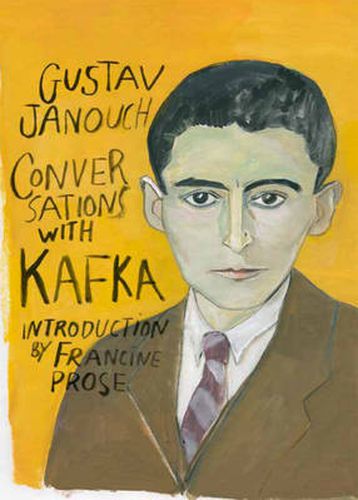Readings Newsletter
Become a Readings Member to make your shopping experience even easier.
Sign in or sign up for free!
You’re not far away from qualifying for FREE standard shipping within Australia
You’ve qualified for FREE standard shipping within Australia
The cart is loading…






Gustav Janouch met Franz Kafka, the celebrated author of The Metamorphosis, as a seventeen-year-old fledgling poet. As Francine Prose notes in her wonderful preface, they fell into the habit of taking long strolls through the city, strolls on which Kafka seems to have said many amazing, incisive, literary, and per- things to his companion and interlocutor, the teenage Boswell of Prague. Crossing a windswept square, apropos of something or other, Kafka tells Janouch, ‘Life is infinitely great and profound as the immensity of the stars above us. One can only look at it through the narrow keyhole of one’s personal experience. But through it one perceives more than one can see. So above all one must keep the keyhole clean.’ They talk about writing (Kafka’s own, but also that of his favorite writers: Poe, Kleist, and Rimbaud, who transforms vowels into colors ) as well as technology, film, crime, Darwinism, Chinese philosophy, carpentry, insomnia, street fights, Hindu scripture, art, suicide, and prayer. Prayer, Kafka notes, brings its infinite radiance to bed in the frail little cradle of one’s own existence.
$9.00 standard shipping within Australia
FREE standard shipping within Australia for orders over $100.00
Express & International shipping calculated at checkout
Gustav Janouch met Franz Kafka, the celebrated author of The Metamorphosis, as a seventeen-year-old fledgling poet. As Francine Prose notes in her wonderful preface, they fell into the habit of taking long strolls through the city, strolls on which Kafka seems to have said many amazing, incisive, literary, and per- things to his companion and interlocutor, the teenage Boswell of Prague. Crossing a windswept square, apropos of something or other, Kafka tells Janouch, ‘Life is infinitely great and profound as the immensity of the stars above us. One can only look at it through the narrow keyhole of one’s personal experience. But through it one perceives more than one can see. So above all one must keep the keyhole clean.’ They talk about writing (Kafka’s own, but also that of his favorite writers: Poe, Kleist, and Rimbaud, who transforms vowels into colors ) as well as technology, film, crime, Darwinism, Chinese philosophy, carpentry, insomnia, street fights, Hindu scripture, art, suicide, and prayer. Prayer, Kafka notes, brings its infinite radiance to bed in the frail little cradle of one’s own existence.